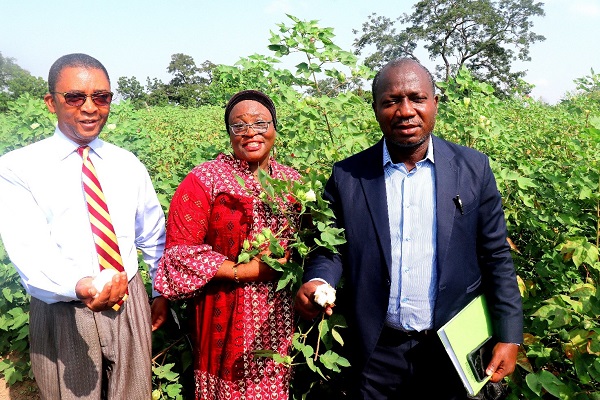
The National Biotechnology Development Agency (NABDA) has said the adoption and acceptance of the pod-borer resistant cowpea and other genetically-modified crops by farmers as the key to the success of the commercialization of these crops in Nigeria.
Speaking at a workshop themed ‘PBR Cowpea – A Model Public-Private Partnership (PPP) for Food Nutrition Security in Africa’, the director-general/CEO, NABDA, Prof. Abdullahi Mustapha said that NABDA played key role in securing regulatory approval and commercial release of Bt. Cowpea and that efforts to commercialise would be abortive if the crop is not adopted and accepted by farmers and consumers.
Mustapha’s position was echoed by the Open Forum on Agricultural Biotechnology (OFAB) in Africa, Nigeria chapter, the African Agricultural Technology Foundation (AATF), Kenya and the United State Department of Agriculture (USDA) – all organisers of the post-PBR cowpea commercialisation workshop.
The workshop was part of efforts aimed at forming partnerships and alliances for the long-term sustainability of Bt. Cowpea, to enhance the fast adoption of the seed, increase the number of champions who would help promote the acceptance of the seed across the country as well as catalyse the crop’s potential to revolutionise Nigeria’s agriculture and fortune of her farmers.
Mustapha, who was represented by the coordinator, OFAB Nigeria, Dr. Rose Gidado, stressed that the post-commercialisation environment, therefore, requires sustainable outreach efforts with diverse stakeholders.
He said the place of building understanding and attracting attention by bringing science closer to the people cannot be over-emphasised.
On his part, the director-general/CEO, National Biosafety Management Agency (NBMA), Dr. Rufus Ebegba while making his presentation on ‘Validating Nigeria’s Biosafety Regulation System for Food Crops: The Case of PBR Cowpea’, said despite great potentials associated with the products of modern biotechnology, perceived concerns as negative impacts exist. “Based on these concerns and taking into account risks to human health, NBMA applies all regulatory measures to ensure safety in the use of commercialized PBR cowpea,” he explained.
According to the former AATF’s regional director, West and Central Africa, Dr. Issoufou Kollo said the sub-Saharan Africa accounts for 95 per cent of cowpea availability (with Nigeria responsible for 47 per cent of this). The Niger Republic, Cameroon, Burkina Faso and Mali account for the rest. He said cowpea is the main protein source and commercial crop that plays a vital role in the food security in the region.
Similarly, counsellor for agricultural affairs, USDA, Nigeria, Benin and Cameroon, Mr. Gerald Smith noted that the commercialisation of Bt. Cowpea – which is a major success story in Nigeria’s agricultural sector – was not an overnight success but a milestone achieved by over two decades of research, field trials and risk assessment by multiple stakeholders in Nigeria and across the world. He said cowpea is a staple crop in sub-Saharan Africa (SSA) but, hitherto, farmers face a lot of challenges in growing it due to pests’ invasion and the application of pesticides.
Other facilitators at the workshop were Mr. Benno Van Der Laan, who spoke on ‘Agricultural Biotechnology Developments Around the World’; AATF stewardship manager, Dr. Francis Onyekachi, ‘Resilient Stewardship for Sustainability of PBR Cowpea in smallholder context’ and MD/CEO, Agro Nigeria, Richard Mark Mbaram, who spoke on ‘Strengthening Public-Private Partnerships in Product Development and Commercialisation in Africa’ gave a template for reinforcing partnerships between the public and private sector stakeholders in the development and commercialisation of biotechnology products in Africa.
The immediate past president, Genetics Society of Nigeria (GSN), Prof. Emmanuel Kwon-Ndung and the director-general, National Agricultural Seed Council of Nigeria (NASC), Dr. Philip O. Ojo, gave goodwill messages. Testimonies of positive returns were received from farmers who planted cowpea in the country.
Other participants in the workshop included the country coordinator, PBS Nigeria, Dr Matthew Dore; DG/CEO, SHESTCO, Prof. Oyenekwe Paul.; President, Biotechnology Society of Nigeria (BSN), Prof. Yerima Bello; Former DG/CEO, NABDA, Prof. Solomon Bamidele and DG/CEO, National Quarantine Service (NAQS), Dr. Vincent Isegbe.

